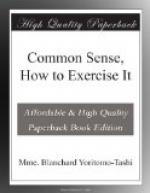“Habits, acquired in view of certain realizations, ought to be dropt from the moment the purpose is accomplished, or that it is weakened.”
It is by absolutely perpetuating those habits, whose pretext has disappeared, that one sees the achievement of certain actions which have been roughly handled by common sense.
“There are,” again says the philosopher, “certain customs, whose origin it is impossible to remember; at the time of their birth, they were engendered by necessity, but even tho their purpose be obliterated, tradition has preserved them in spite of everything, and those who observe them do not take into consideration their absurdity.
“People of common sense refrain from lending themselves to these useless practises, or, if they consent to allow them a place in their thoughts it is that they attribute to them some reason for existence, either practical or sentimental.”
Direction is indicated by circumstances, by environment, or by necessity.
There is direction of resolutions as well as direction of a journey; it is necessary, from the beginning, to consider well the choice of a good route, after having done everything possible to discriminate carefully between it and all other routes proposed.
It happens, however, that the way leads also through the cross-roads; it is even indispensable to leave the short cuts in order to trace the outline of the obstacles.
Direction is, then, an important factor in the acquiring of common sense.
The putting of the question takes its character from comparison, from experience, and principally from approximation; but it is in itself a synthesis of all the elements which compose common sense.
He who wishes to acquire common sense should be impregnated with all that has preceded.
Then he will discipline himself, so as to be able to judge, by himself, of the degree of reason which he has the right to assume.
He will begin by evoking some subject, comparing its visual forms with, those forms which he understands the best, in other words, to the perceptions which are the most familiar to him.
If it concerns a question to be solved, he will try to recall some similar subject, and establish harmony, by making them both relative to a common antecedent.
Yoritomo advises choosing simple thoughts for the beginning.
“One will say, for example:
“Such a substance is a poison; the seeds of this fruit contain a weak dose of it; these seeds could then become a dangerous food, if one absorbed a considerable quantity.
“Common sense will thus indicate a certain abstaining from eating of it.
“Then one may extend his argument to things of a greater importance, but taking great care to keep within the narrow limits of rudimentary logic.
“One must be impregnated with this principle:
“Two things equal to a third demand an affirmative judgment or decision.




